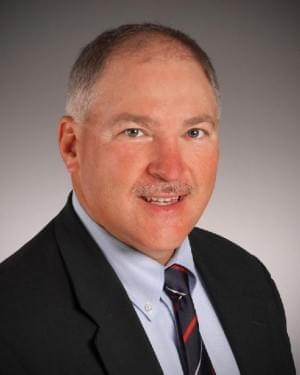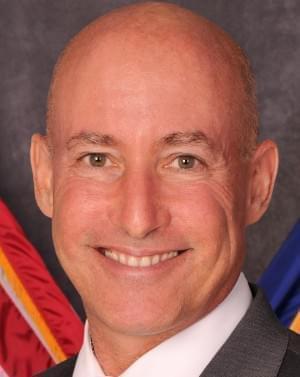Regional VA Hospitals Adapt To Veterans Choice Program

Veterans Administration hospitals in the Chicago area, left, and Madison, Wis., are two of three such facilities that provide service to veterans living in northern Illinois and southern Wisconsin. Hines/Provided -- Madison/Sue Stephens/WNIJ
Some of the key participants in the Choice Program are regional hospitals. We continue our examination of this program by talking with managers and administrators at two facilities serving veterans in northern Illinois.
The Choice Program is designed to help veterans who are trying to receive specialist care that is either too far away, or the wait time for an appointment is too long. Veterans interested in the program talk to either their primary doctors or local veterans assistance center. These people then refer the veterans to a regional VA hospital.
“If that’s over 30 days or we do not offer that care, or it’s over 40 miles, then a consult is placed or they’re referred to our department," says Carolina Mosely, Clinical Nurse Manager for the Office of Community Care at Edward Hines, Jr., Veterans Hospital in the Chicago suburb of Hines.
Professionals like her act as liaisons between patients and doctors but, at a national level, these arrangements go through two third-party contractors. Mosely says she guides eastern U.S. veterans to Health Net.
“We’ll give them the website. They go in, they fill out the packet, and the patient can see that physician. If they choose not to do that, they can choose another physician off the providers list," she said, "and then we have our own list where we can sign that provider up also. We’re creating a national, integrated set of providers.”

Dr. Alan Bridges, Chief of Staff at William S. Middleton Memorial Veterans Hospital in Madison, Wis.
Regional hospitals like Hines aren’t allowed to create these databases on their own, which can make dealing with the contractors difficult. However, Dr. Alan Bridges, Chief of Staff at William S. Middleton Memorial Veterans Hospital in Madison, Wis., notes that Health Net and its counterpart TriWest still have a role to play.
“They set up these regions and these contracts," he said, "and that’s the setup for the money exchange, the reimbursement.”
Bridges says Congress didn’t give much guidance to regional hospitals on how to assemble these regional offices. He also notes that lawmakers didn’t allocate infrastructure funding for specific hospitals.
“The contractors, Health Net and TriWest, probably didn’t have the infrastructure required to fully implement the program," he said. "In addition, they didn’t have enough physicians.”
To compensate, both Madison and Hines hired extra staff. Mosely explains how she set up her office at Hines.
“We hired some RNs, because I needed some nurses with varied backgrounds to be able to really, really make sure that my patients got the care they need," she said. "We hired some LPNs, and then we have administrative staff.”
This makes Mosely's office about half clinical and half administrative, along with what she calls "intense case management." Hines serves Chicago and its suburbs, as well as sections of northern Illinois, so her office authorizes about 250 referrals each week.
Madison has just as wide a service area, extending into Illinois and part of Michigan’s Upper Peninsula. However, Bridges said the Choice program hasn’t exactly shortened veterans’ wait times.
"Even though the VA may be beyond 30 days," he said, "we can often get a veteran in for care in 40 or 45 days -- which is before the private sector can get them in.”

Dr. Steve Braverman, director of Edward Hines Jr. Veterans Hospital.
Dr. Steve Braverman, director at Hines Hospital, says veterans have caught on to this pattern.
“One of the interesting things that we’ve found is that, when we’ve offered Choice in many situations, our veterans have declined it because they prefer to get their care here even if it means a longer wait,” he said.
Bridges also noted his hospital volume is higher than some regional counterparts because Wisconsin didn't expand Medicaid under the Affordable Care Act. He said VA care doesn’t have monthly premiums.
“Veterans pay for an episode of care unless they’re service-connected,” he said. “Then they get that care for free.”
It remains difficult for regional hospitals and private doctors to schedule appointments and properly share medical records. To fix this, the hospitals are “reinventing” the underlying systems at a national level. Mosely says this means changing the underlying technology.
“One of them will allow the outside providers to have access to the patients’ information, like their actual chart, real time,” she said.
That change is already under way, and other reforms aim to improve communication with these private doctors.
In the end, Bridges sees the Choice Program as a well-intentioned but flawed effort to get veterans the care they need. But he’s still optimistic about upcoming reforms.
“As we’re developing more infrastructure and getting better communication across the different program lines," he said, "I think that, going into the future, we should have a very, very good program that will allow the goals to be realized.”
The U.S. Congress originally budgeted $10 billion for the Choice Program, but it had a sunset date of August 7. However, President Donald Trump signed a law in April permitting the VA to spend the remaining funds until January 2018.
Links
- Those Charged With Helping Veterans Share Their Views On Veterans Choice
- Vets Call Veterans Choice ‘A Piece Of Cake,’ ‘A Nightmare,’ And Everything In Between
- Veterans Choice Program; Illinois Hate Crimes Bill; Politics: Still No State Budget
- Tweaks Made To Veterans Choice, But Overhaul Remains Elusive
- Veterans Administration Hospital In Need Of Women’s Clothing Donations
- Center For Wounded Veterans Celebrates First Veterans Day Since Opening Its Doors
- Governor Attends Dedication For New Center For Wounded Veterans At U Of I

